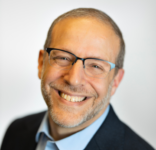
On April 5, 1968, Debbi Kaner Goldich celebrated her bat mitzvah. It was a Friday night at Temple Shalom in Milton, Massachusetts, the Conservative synagogue where her family belonged.
Kaner Goldich got up on the bimah and chanted a Haftorah. That was it. She was a woman.
“Many other women I know were part of congregations that were conservadox. They didn’t even get to do that,” she said.
Kaner Goldich, 67, has lived to see young girls become bat mitzvahs during the same extensive ceremony through which young boys become bar mitzvahs. She has even witnessed women become rabbis in Conservative congregations.
But the outgoing president of Women’s League for Conservative Judaism, an international organization that helps Conservative Jewish women, has not merely lived to see such changes. The Blue Bell resident played a small role in making them happen.
As an email from the Women’s League makes clear, Kaner Goldich’s signature accomplishment with the organization was taking it through the pandemic. Her “robust roster of online programs” included a bat mitzvah class for women in their 80s. Once a month for three years, the women learned from female rabbis how to read Hebrew and Torah. As many as 750 people learned Hebrew through the class in that time.
Kaner Goldich explained that those women grew up during an era when the Conservative movement was not egalitarian.
“My obligation to them was to fill in what we didn’t get,” she said.
The former member of Temple Sinai in Dresher and current member of the Shirat Hayam Congregation in Ventnor, New Jersey, is leaving her Women’s League post at the organization’s triannual convention on July 16. But she is not planning on slowing down her activity in the movement. On Aug. 1, she will become chair of the board of the Ziegler School of Rabbinic Studies. She also serves on the board of the United Synagogue of Conservative Judaism, the Jewish Theological Seminary and other organizations.
“It’s been my life,” she said. “I’m very proud to be a woman. I’m very proud to be a Jewish woman.”
Today, about half of the Conservative students in rabbinical and cantorial seminaries are women, according to Kaner Goldich. She also recently read a statistic that half of the Conservative synagogues in North America have female presidents.
Women’s League focuses on supporting Sisterhoods since they are often the groups from which female leaders emerge. Kaner Goldich mentioned that Har Zion Temple in Penn Valley recently named Lynne Landsburg as co-president. Landsburg was the congregation’s Sisterhood president for four years.
“That’s a typical road to leadership for our women,” Kaner Goldich said.
Conservative Judaism has evolved in this way because while it is traditional, it is also still progressive, according to Kaner Goldich. It’s traditional in the sense that its Jews observe Shabbat, keep kosher and observe major holidays like Rosh Hashanah, Sukkot and Passover for two days instead of one.
But it’s progressive in the sense that women can read Torah and take on leadership roles in synagogue communities. During the pandemic, the Rabbinical Assembly said Conservative Jews could gather online.
“It offers both,” Kaner Goldich said.
At the same time, Conservative Judaism is losing members, according to a 2021 Pew Research Center survey. The same survey revealed that Orthodox Judaism had more than twice as many adherents as Conservative Judaism between the ages of 18 and 29. It also showed that Reform Jews had more than three times as many members. The Conservative denomination seemed lost in the middle.
But it still has an important role to play, according to Kaner Goldich. The 67-year-old lives for more than half the year in Arizona, and she is a member of two Conservative shuls there: Beth El Congregation in Phoenix and Congregation Or Tzion in Scottsdale. She’s committed not just to Jewish practice, but to the specifically Conservative branch of the religion.
Why?
Because she wants to be more traditional, but she also wants to be able to read Torah as a woman.
Judaism is not about practicing one way, Kaner Goldich explains. It’s a broad range. There’s something for everybody. A Jew is a Jew. And some Jews want to be more traditional while still leaving room to progress.
“It’s a portal to Judaism,” Kaner Goldich said.
But perhaps one with a marketing problem.
“We need to just be who we are, and we need to promote ourselves in a positive way,” Kaner Goldich concluded.






